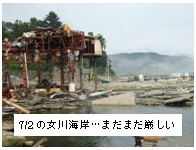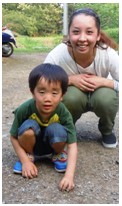Miyagi Support Center News "Link (Yui)" No. 25, July 2, 2011
Let's support our fellows in Tohoku with our bonds of friendship and strengths.
Issued by the Miyagi Support Center and the Northern Miyagi Support Center of the Japan Disability Forum (JDF) Headquarters for the Comprehensive Support for Persons with Disabilities
Miyagi Support Center Office: c/o Hagi-no-sato Fukushi-kojo, Taihaku-Ku, Sendai City
Phone: +81-80-4373-6077
Fax: +81-22-244-6965
Miyagi Northern Area Support Center Office: c/o Wakaba-en, Towa-Machi, Tome City
Phone: +81-90-8349-9403
Fax: +81-220-45-2223
http://www.dinf.ne.jp/doc/english/resource/tohoku_earthquake.html
Protecting, keeping, and developing lives of persons with disabilities.
More than 3 months have passed since March 11 disaster, and activities of Miyagi Support Center have been gradually changing. Our hands-on support activities may seem to be divided into the following 3 phases based on the time frame and subsequent changes of activities.
The first phase implies such activities to protect lives of persons with disabilities as mobile activities to shelters and centers/facilities for confirming their locations and making necessary support arrangements for them. The second phase implies such activities to keep lives of persons with disabilities as the supply of foods and goods and the support for house conditions. In this phase, we entrust persons with disabilities, whose locations we confirm, to relevant relief organizations to meet their basic needs for survival at shelters or their own homes at disaster areas. The third phase implies such activities to develop lives of persons with disabilities along with improvements of their daily livings conditions through moving from shelters to temporary housings and reopening of centers/facilities. In this phase, we try to make their lives better than pre-disaster time by means of cooperative support activities for their living and working conditions with relevant support organizations.
We have been implementing our support activities to meet individual’s needs with careful attention to the characteristics of the situation of each person and on-going changes in their living circumstances.

Photograph 1: Onagawa-seashore on July 2; remains less progress towards reconstruction.
Disability experts involved in JDF activities
"I want to talk with someone who understands me. I would like to dispel the ill feeling of the heart through talking with others who come to visit us. Just talking with others among victims seems to make us depressed," a mother who has a child of the autism told us at the shelter we visited.
Our third phase activities to develop lives of persons with disabilities seemed to be requested into details. The following requests were common in our daily duties at JDF to respond to. Requests for;
- talking with them,
- helping them to find works,
- advising for their works going well, and
- helping them to find new locations to move to.
About 500 volunteers who are the staff of centers/facilities all over the country from the north to the south (Hokkaido to Okinawa) have come to help us implement our support activities by turns. We would like to take this advantage of a variety of professionals involved in our activities, such as social workers, occupational therapists, nurses, care workers, etc., for our future activities.
(Isobe, the 14th course bureau chief)
We are recruiting more volunteers at disaster areas.
Please call: +81-80-4373-6077
Activity description:
(1) Volunteers at Support Centers
Visits to shelters and centers/facilities in disaster areas to find and respond to their needs.
(2) Secretariats
Telephone consultation, office works for general affairs, public information and accounting, etc.
Place for activity:
Miyagi Support Center (Sendai City) and Miyagi Northern Area Support Center (Tome City)
Statistics of activities:
Support Center consultations up to June 30
1,407 persons
After-school support to help family members join together (Minami-sanriku-cho)
The boy is an elementary school student (1st grader). After the disaster on March 11, he moved from Minami-sanriku-cho to live with his grandparents in their temporary house. This time, he was referred from the community activity support center Kaze-no-sato to us for after-school support. His grandmother had become busy in these days for taking care of his great-grandmother at a hospital a few times a week. His grandfather was also out of home in the daytime for work. So, they requested that someone take care of him after school until his grandfather comes home in the evening.
He loves dogs and stones. He plays lively until it becomes dark. His grandmother said, "We would like to have people in this town understand him so that we can continue to live in this town with more generosities from various people." What she said let us realize vividly our tasks to be done and the reasons why we were there. We, moreover, were encouraged by her thanks words.

Photograph 2: The boy at Minami-sanriku-cho.
New wind rustled by a professional approach. (Yasuragi Workshop, Yamamoto-cho)
Nearly 2 months have passed since JDF started supporting the workshop for restoration. Volunteers with different professional backgrounds come to support them by weekly turns. For this week, an Occupational Therapist (OT) volunteer participated in the support activities. One day, the OT made an occupational consultation with a person who was seeking for a work. The OT made advices on how to write the personal history and how to respond at the interview. The person seemed to get a little more confident through the consultation.
On the same day, the OT was consulted by a mother who has a child with developmental disability. Volunteers sometimes show ability in each professional’s proud field. We hope such complimentary allocation of volunteers may accelerate the workshop's restoration.
A call for help (Minami-sanriku-cho)
Miyagi Support Center received a call in the evening of a recent day. It was from a public health nurse in Minami-sanriku-cho who was consulted by a shelter manager at the hot spring facility in Osaki-city.
"Please go to the shelter tomorrow as early as possible to pick up a woman for hospital!" said the public health nurse. The woman is a survivor of March 11 disaster at Minami-sanriku-cho. She lost control of her conditions because she had been unable to visit a hospital far away from the shelter and her medicines had already run out a while after the disaster. Her father came to the shelter manager for help, saying "Something is wrong in my daughter's conditions!"
Next early morning, we reached Osaki-city after 1-and-a-half-hour driving and gave her a lift to the hospital in Kesen-numa-city. I took more 2 hours to arrive at the hospital. Upon arrival, we felt relieved very much because she could finally receive her medicines. The streets we passed in the one-day trip seemed to progress for restoration gradually, but we realized that our activities to protect lives of persons with disabilities were still necessary.
A word from volunteers
Total number of volunteers up to July 2: 491 persons

Photograph 3: a volunteer from Tokyo.
I engaged with support activities at a welfare facility in Ishinomaki-city for a week. The scenes of disaster area always made me think what I can do for the victims. Actually, what I can do was far from enough. Keeping it in mind, I exerted myself for a step-by-step progress. (a volunteer from Tokyo)

Photograph 4: another volunteer from Tokyo.
I learned importance of listening closely to the people in disaster areas. As time had passed since March 11 disaster, not only assistance in kinds but also assistance to solve their troubles in the depths of the heart seemed to be important. I wish they do not feel a sense of separateness to live and enjoy interaction with others. (another volunteer from Tokyo)
Translated by Japanese Society for Rehabilitation of Persons with Disabilities
Volunteer translator: Mr. Isamu Konishi
